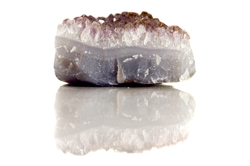Analysis of crystalline rock retention
Significant uncertainty associated with conceptual, experimental and theoretical descriptions of retention processes impedes their effective application. Highly conservative estimates are required to ensure safety. In response to concerns of national waste management organisations regarding radionuclide transport in host rock far-field, scientists initiated the EU-funded project 'Crystalline rock retention processes' (CROCK). Investigators are developing a tool that lowers uncertainty to support performance and safety assessment, increasing both safety and confidence in geological waste disposal. In order to do so, they are studying the systems in the field and in the laboratory, and using natural homologues. Samples are analysed over scales from nano-resolution up to real-site kilometre-scale, and include oxidised and intact non-oxidised materials. Experimental work and data analysis are being used to develop model descriptions of retention processes. During the first 18 months of CROCK(opens in new window), the team obtained new samples of fracture crystalline rock drill-cores as well as samples from previous studies and began spectroscopic characterisation. Scientists are studying the retention behaviour of samples regarding various radionuclides of interest, already obtaining important diffusion and sorption results. They are using this and existing data in models of sorption and surface reactivity. Finally, the overall goal of producing tools for uncertainty reduction is progressing with two novel modelling approaches and a numerical tool. CROCK is a major undertaking to verify the vast amounts of published data on oxidised nuclear waste as well as to investigate phenomena of the intact non-oxidised system. The data and analyses will be fundamental to the development of tools to reduce uncertainties associated with radionuclide retention in geological disposal sites. They are also important for the long-term competitiveness of the EU nuclear energy programme.







